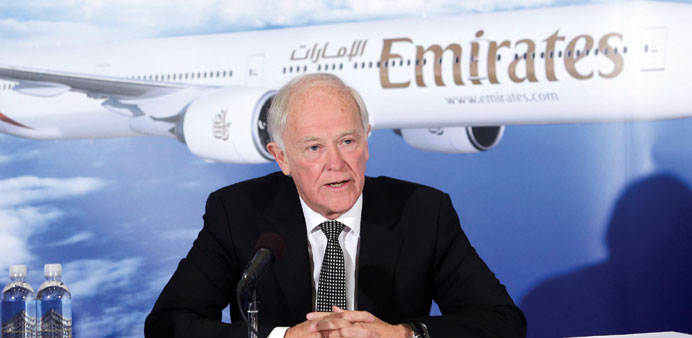Clark addresses a press conference at the National Press Club in Washington DC yesterday.
Bloomberg /Washington
Gulf airline Emirates issued a 350-page report rejecting allegations that it has received $6bn in state subsidies, saying the rival US operators that made the claims have skewed their facts and legal arguments.
The Dubai-based carrier, ranked No 1 in the world by international traffic, produced a point-by-point rebuttal of the assertions from American Airlines Group, Delta Air Lines and United Continental Holdings - which it says favour so-called open skies treaties only when to their advantage.
“Their mess of legal distortions and factual errors falls apart at the slightest scrutiny,” Emirates president Tim Clark said in a statement in Washington yesterday. “The big three are far from being harmed financially by Emirates’s operations, and they are not even operating in the same markets that we are.”
The US carriers alleged in January that Emirates, Qatar Airways and Etihad Airways of Abu Dhabi have received a collective $42bn in aid over the past decade. They followed up with a 55-page white paper detailing the claims and have begun a lobbying campaign aimed a persuading the government to deny further US access to the Gulf companies.
Emirates said its representatives met with officials from the US Departments of State, Transport and Commerce on Monday to respond to subsidy assertions spanning fuel-hedging and user fees at Dubai International airport to the cost advantages of the UAE’s labour laws.
The Obama administration has said that it is currently reviewing air-service agreements with both the UAE and Qatar.
Emirates said its dissection of the US allegations is “comprehensive” and based on “hard facts,” adding that its American opponents assert liberal principles, when the “reality is they favour Open Skies agreements only when such work to their financial advantage, and they seek to lock out airlines that offer consumers a competitive choice.”
On fuel hedging, Emirates said a contract was transferred to parent Investment Corp of Dubai in 2008 during an oil-price plunge to avoid giving a “misleading picture” of its performance. Losses were paid at maturity from the airline’s own cash resources and the recovery in crude prices meant ICD ultimately made a $100mn profit on the switch.
Emirates also denied receiving subsidies from entities including sister company and ground-handling specialist Dnata, Dubai International Airport and Dubai Aerospace Enterprise, saying transactions are conducted on an arm’s-length basis.
It added that commercial rates are paid for jet fuel from suppliers BP, Chevron Corp, Emojet/Exxon Mobil Corp, Emirates National Oil Co, or Enoc, and Royal Dutch Shell.
Analysis shows that prices charged by local producer Enoc “closely tracked” those at its peers and were if anything slightly higher, on average, the airline said.
“The case put forward by Delta, United and American Airlines against Emirates is full of holes, and if their protectionist campaign were to be successful, it will not end with just the Gulf airlines,” Clark said.

